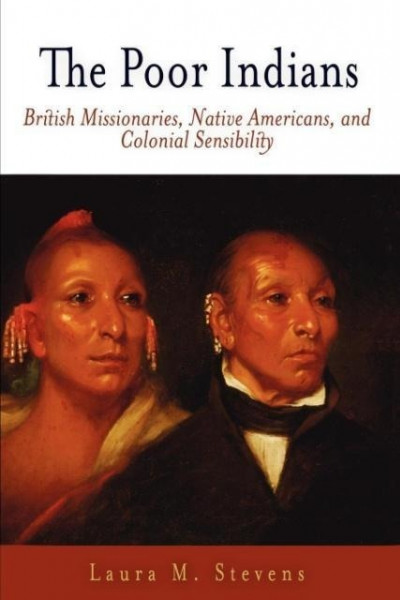
The Poor Indians: British Missionaries, Native Americans, and Colonial Sensibility
Kurzinformation
inkl. MwSt. Versandinformationen
Artikel zZt. nicht lieferbar
Artikel zZt. nicht lieferbar

Beschreibung
The Poor Indians British Missionaries, Native Americans, and Colonial Sensibility Laura M. Stevens "Stevens has written a thoughtful study of British missionary culture. Most important, she reveals how philanthropy shaped the identity of a transatlantic British public and the ways that identity has resonated from the seventeenth century all the way up to our time."--New England Quarterly "Eloquent and important. . . . This is a work of careful textual analysis that harbors many riches for historians. Stevens's analysis of the discourse of Christian charity will travel well into other fields and periods of study, particularly those that address Christian missions to Africans and African-Americans."--Literature and History Between the English Civil War of 1642 and the American Revolution, countless British missionaries announced their intention to "spread the gospel" among the native North American population. Despite the scope of their endeavors, they converted only a handful of American Indians to Christianity. Their attempts to secure moral and financial support at home proved much more successful. In The Poor Indians, Laura Stevens delves deeply into the language and ideology British missionaries used to gain support, and she examines their wider cultural significance. Invoking pity and compassion for "the poor Indian"--a purely fictional construct--British missionaries used the Black Legend of cruelties perpetrated by Spanish conquistadors to contrast their own projects with those of Catholic missionaries, whose methods were often brutal and deceitful. They also tapped into a remarkably effective means of swaying British Christians by connecting the latter's feelings of religious superiority with moral obligation. Describing mission work through metaphors of commerce, missionaries asked their readers in England to invest, financially and emotionally, in the cultivation of Indian souls. As they saved Indians from afar, supporters renewed their own faith, strengthened the empire against the corrosive effects of paganism, and invested in British Christianity with philanthropic fervor. The Poor Indians thus uncovers the importance of religious feeling and commercial metaphor in strengthening imperial identity and colonial ties, and it shows how missionary writings helped fashion British subjects who were self-consciously transatlantic and imperial because they were religious, sentimental, and actively charitable. Laura M. Stevens teaches English at the University of Tulsa. Early American Studies 2004 | 272 pages | 6 x 9 | 5 illus. ISBN 978-0-8122-3812-9 | Cloth | $39.95s | £26.00 ISBN 978-0-8122-1967-8 | Paper | $24.95s | £16.50 World Rights | History, Native American Studies Short copy: Missionary work, arising from a sense of pity, helped convince the British that they were a benevolent people. Stevens relates this to the rise of the cult of sensibility, when philosophers argued that humans were inherently good because they felt sorrow at the sign of suffering. von Stevens, Laura M.
Produktdetails

So garantieren wir Dir zu jeder Zeit Premiumqualität.
Über den Autor

- Hardcover
- 384 Seiten
- Erschienen 2007
- For Dummies

- Taschenbuch
- 352 Seiten
- Erschienen 2016
- NORDIC INST OF ASIAN STUDIES

- hardcover
- 80 Seiten
- Erschienen 2008
- Ravensburger Verlag GmbH

- Hardcover
- 323 Seiten
- Erschienen 2003
- University of Nebraska Press




 bestellen
bestellen


































